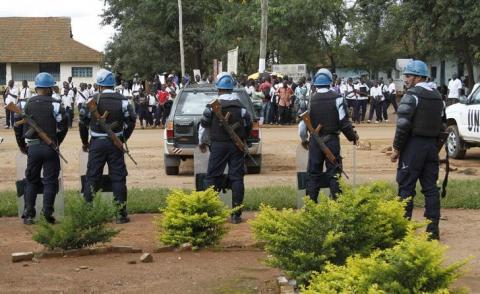Advertisement
U.N. experts say Congo obstructs probe of U.N. monitors' killings - note
NEW YORK (Reuters) - Congolese security officials are interfering with the investigation into the killings of two U.N. sanctions monitors last year in central Democratic Republic of Congo, U.N. experts deployed to assist the investigation said.
The charge came in a confidential note by the United Nations' Department of Political Affairs that was dated April 18 and circulated among Security Council members on the progress of a team of experts sent to Congo in November by U.N. Secretary-General Antonio Guterres to support Congolese officials' investigation into the killings.
The note was seen by Reuters on Tuesday. A Congo government spokesman could not be immediately reached for comment.
U.N. sanctions monitors Zaida Catalan, a Swede, and Michael Sharp, an American, were killed in March 2017 in the central Kasai region while investigating violence there between government forces and a local militia.
The note said that the team, led by Canadian lawyer Robert Petit, attempted "to develop a productive working relationship with the DRC prosecuting and national authorities but has faced difficulties in gaining full cooperation."
"Several key arrests have taken place, but progress in the investigation continues to be hampered by the continued interference of the security apparatus," it said.
The U.N. note did not say who specifically was obstructing the probe.
Congolese officials say they are determined to bring to justice the perpetrators. They have blamed the killings on the Kamuina Nsapu militia, which rose up in August 2016 after government forces killed a local chief who had demanded that they withdraw from Kasai.
Congolese authorities have arrested 12 suspects who are on trial and 14 more are being tried in absentia. However, the trial was indefinitely suspended in October, and the court has not said when proceedings will resume.
The note said that the experts were not granted access to key witnesses and interrogations, including of two suspects arrested in March, nor to the whereabouts of another key witness who acted as an interpreter to Catalan and Sharp at a meeting the day before they were killed.
Reporting by Reuters and Radio France Internationale (RFI) in December found that at least one other participant in that meeting, during which the following day's fatal trip was organized, was an informant for the national intelligence service (ANR).
The year-long insurrection in Kasai killed up to 5,000 people and forced about 1.5 million from their homes. The United Nations and advocacy groups accused government forces of widespread human rights violations, charges the government has denied.
(Additional reporting and writing by Aaron Ross; Editing by Cynthia Osterman)



















Add new comment